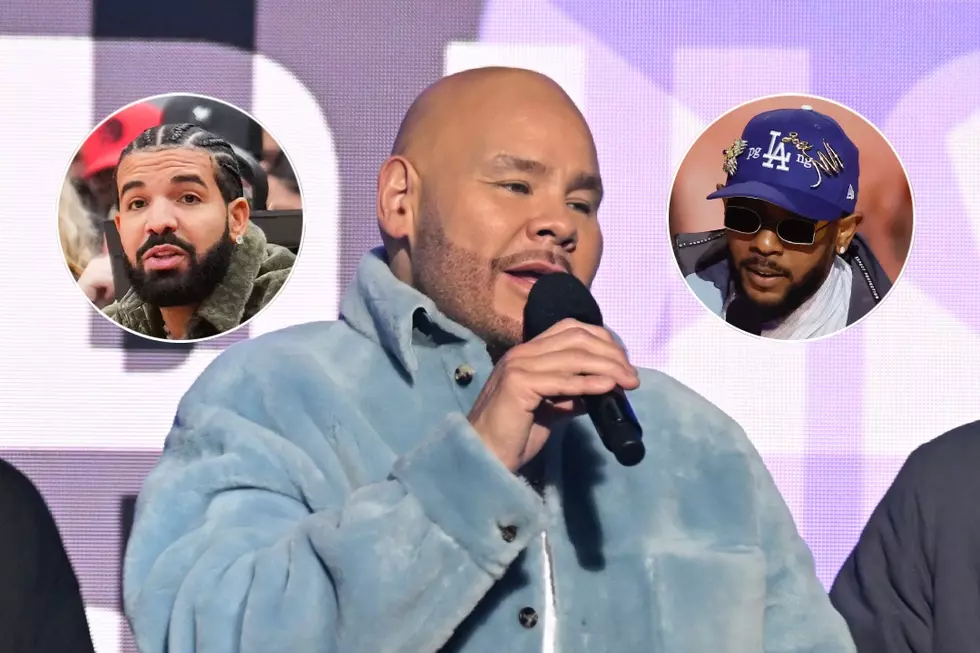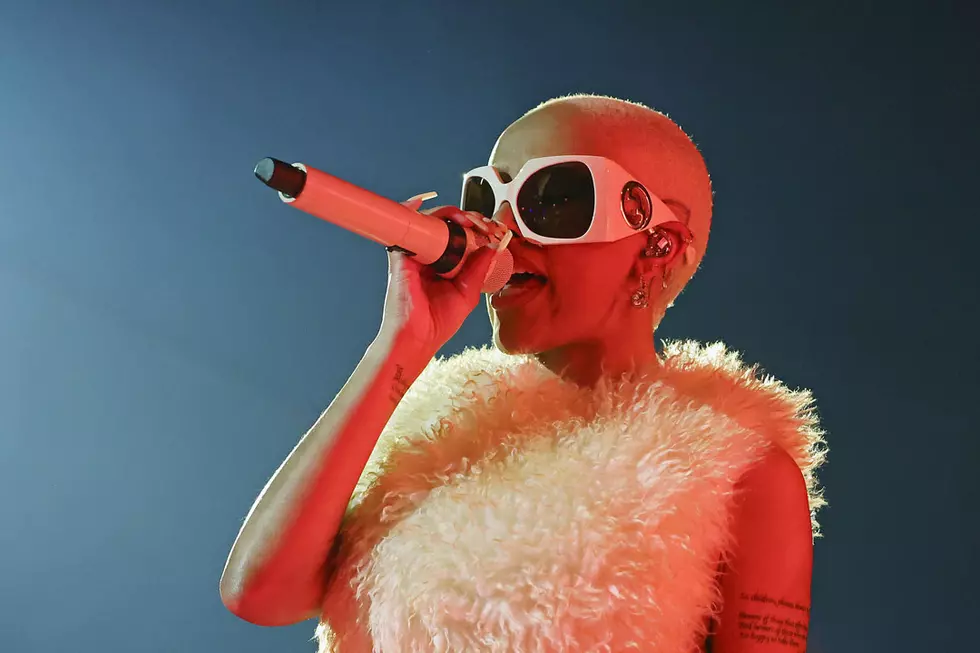Fabolous
Home Improvement
 At a time when hip-hop’s birthplace is comatose creatively, it’s up to NY’s finest word slingers to put the five boroughs back on the rap radar. After releasing 2004’s street smash, “Breathe,” arguably the best song of his career, F-A-B-O seemed destined for a spot atop of NYC’s rap pantheon. But when slow sales of his Atlantic debut, Real Talk, caused the label to pull the plug, Fabolous found himself looking for a way out. Finally free from Atlantic, and freshly-inked to Def Jam, Loso speaks with XXLMAG.COM about why he had to leave Atlantic, why he choose Def Jam, his thoughts on Minister Murder Ma$e, and what’s going with the Street Fid-id-id-id-dam.
At a time when hip-hop’s birthplace is comatose creatively, it’s up to NY’s finest word slingers to put the five boroughs back on the rap radar. After releasing 2004’s street smash, “Breathe,” arguably the best song of his career, F-A-B-O seemed destined for a spot atop of NYC’s rap pantheon. But when slow sales of his Atlantic debut, Real Talk, caused the label to pull the plug, Fabolous found himself looking for a way out. Finally free from Atlantic, and freshly-inked to Def Jam, Loso speaks with XXLMAG.COM about why he had to leave Atlantic, why he choose Def Jam, his thoughts on Minister Murder Ma$e, and what’s going with the Street Fid-id-id-id-dam.
So, Fab, up until the Loso’s Way mixtape, we hadn’t heard a lot from you. What have you been up to?
I was switching my situation. I was over at Atlantic Records and I switched my situation over there. Now I’m signed at Island/Def Jam. In between that time, I was just letting everything go through as far as the paperwork. It’s a funny game, because I didn’t want to make a record and create a situation where I’m hot again and then Atlantic says, Nah we’re not letting this guy go. I definitely didn’t want to do that. So I chill and fall back. I did a few little mixtape songs and I did few appearances as far as keeping myself in the R&B remix category and that’s really it. I’m ready to start working. We got everything rolling. Def Jam is behind us.
Is the Def Jam deal finalized?
Yeah, it’s brand new. I haven’t even gone up there and talked to anybody yet because it’s so new. You guys are one of the first people aside from MTV who really knew about the switch. It’s been buzzing through the streets on the underground tip, but I just didn’t make a big thing out of it because I wanted to respect Def Jam’s situation. Maybe they wanted to do something special. I didn’t want to let the cat out of the bag too early before I even spoke to those guys.
There was a rumor that Def Jam traded Musiq to Atlantic for you. Any truth to that?
I’m not sure. Maybe they worked out a situation. I know [for] me it was just about getting the release done and me getting over to Def Jam. It may have been like in the higher power but it wasn’t included in my knowledge. I guess the trade part of it really didn’t have anything to do with me—that’s something that was discussed by the labels. The situation with me was just making sure that my release was straight and that Def Jam was interested and, of course, the financial part of it. But I really didn’t look into it to see if there was a trade involved. The people who are being traded, they don’t really have too much say so in it. [But] I didn’t know if [Atlantic] was a place where I wanted to take a chance of doing another album.
Why is that?
I think they [Atlantic] were dissatisfied with what they got. I was definitely dissatisfied. I’m not saying gold is a bad thing but I felt like I put more into that album and that project. It was just a lot of mishaps internally, just as far as picking the singles and shooting the videos for the singles. Even if the album wasn’t good, I had singles on that album that were huge singles, which should have been used. For instance, with “Breathe” it was a good record and it definitely did a lot of things for me. But I came to Atlantic and I felt like this wasn’t the single I should be using. It still got #1 on 106 & Park and it got high on the countdowns on MTV. I was fortunate for that, but I still needed that kinda song that would maybe hit Top 40, something that would appeal to the masses and not just the urban crowd. So I tried to get them to go with another single but they were like, “No, ‘Breathe’ is growing week by week.” But I guess maybe they were trying to save money, or maybe they really believed that “Breathe” would cross over. Just that risk alone was something that hurt the sales of the album.
What attracted you to Def Jam?
What attracted me to Def Jam is that they building. They have a family of artists, they have Kanye West, they have Young Jeezy, they have Ghostface Killah. They have artists who are all in different realms. It may be a positive and a negative with having Jay-Z [as president], but I also feel like he was an artist so he understands the art of it. Maybe it is a negative because he sets such a high bar. It’s Jay. At the end of the day, it’s a positive and a negative. But I respect that part of it. I respect LA Reid, the success he’s had over there. How they rebuilt somebody as big as Mariah Carey. When everybody had cashed her out of completely existing, they got her with the right team of producers and really marketed her well and she came back. I don’t even think she’s at one of her best times. It’s just the way they marketed her and promoted her and promoted those good songs. There’s no reason you should have good music and you’re stuck with a company that just doesn’t know how to market the music or is watching every penny and slowing everything down because of cost.
It seems that your mixtapes get a bigger reaction from fans than your albums. Have you noticed that?
Yeah. I seen the interest way bigger in the mixtape than the album. The underground gonna love you more for your mixtape style than your album style. I’m really in two different minds when I’m making an album and when I’m making a mixtape. An album, I feel, is more for a spectrum of different listeners. And a mixtape I make for them people who buy mixtapes. I stay real.
You had some pretty harsh words for Ma$e on Loso’s Way.
Yeah, I mean this dude is back at the counter.
I assume you were surprised when you heard his jabs at you.
Yeah. I heard it and I was like, “Oh, wow!” What was crazy is I thought we were okay from when he was the half-rapper, half-pastor. [When] he came back and was doing his “Welcome Back” song, I got a chance to see him in Philly and one of his boys came to my dressing room and was like, “Yo, Ma$e want to holla at you.” So I’m like, okay. I didn’t know what he meant by “holla at me.” So he comes in there like, “Yo, I just wanted to say I appreciate what you doing. I know there’s a lot of things floating around—people are saying this, that and the third—and I just want to let you know, as a man, I’m coming to you to tell you I love what you do.” And [he] put his hand out to give me a handshake. So I looked at him and gave him a handshake. For me, it was done there. Then, out of nowhere, he said that thing on them tapes.
Are you still working on your Street Family imprint? Is Mike Shorey, the R&B singer, still signed?
Yeah, the Street Family thing is just building right now. Mike Shorey, he took a leave, actually. He had some complications [in] dealing with us. We didn’t leave on any hard feelings, but we parted for a minute because he was a young guy and people aren’t always ready for the sacrifices. But we got Paul Cain, Ransom and Stack Bundles. We working with a lot of guys, but not signing [them]. Holding them down. We working with them, and they respect us. Different kind of guys who I knew through my Desert Storm affiliation. But [like] with any movement, all the way from G-Unit to Dipset to Wu-Tang, all those guys have built from the ground up.
More From XXL









